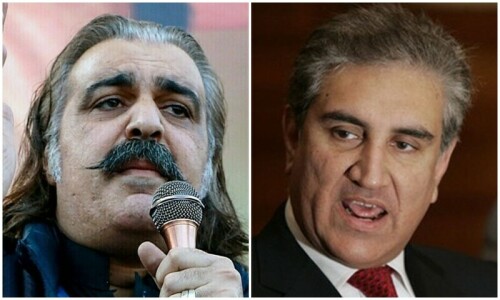NEW DELHI: India said on Tuesday that Pakistan’s demand for de-escalation of military tensions by New Delhi had no meaning, as there was no escalation by its armed forces to begin with.
“We did not escalate tension. We have not done anything to escalate tension. So where is the question of de-escalating it?” Indian Foreign Minister Pranab Mukherjee was reported to have said in response to Foreign Minister Shah Mahmood Qureshi’s statement in a televised address in which he asked India to de-escalate tension along the borders.
The tension, however, did not deter the Directors General of Military Operations (DGMOs) of the two countries from picking up the hotline for their weekly review of the current mess.
According to Indian news agencies, the two DGMOs, during their less than half-hour talks, reiterated their positions on reported military build-up on either side of the border, dismissing them as speculation.
Indian Army sources were also quoted as saying that both sides made it clear that they wanted to reduce the tension and maintain normalcy at the frontiers, and assured each other that the military activities on the border were routine and normal.
To Islamabad’s contention that India had mobilised its army and air force to forward bases, Mr Mukherjee said only normal winter exercises conducted every year had taken place.
He also turned down the plea by domestic hardliners to recall the Indian envoy in Islamabad, saying international diplomacy was the need of the hour. While it could not be “business as usual” with Islamabad, “I do feel still we should continue to put pressure diplomatically through international community to achieve our objectives,” Mr Mukherjee said.
The minister, who has been projected as New Delhi’s tough-talking interlocutor in the post-Mumbai public space vis-à-vis Prime Minister Manmohan Singh, seen as a restrained and more measured votary of diplomacy, however, listed some doables that Islamabad could comply with.
He said he was clear what India wanted from Pakistan. Press Trust of India quoted this to mean “the dismantling of terrorist camps, taking action against those involved in terror attacks and handing over of fugitives like the chief of the banned Jaish-e-Muhammed (JeM) Masood Azhar.”
The comments appeared to recast some of the old formulations in which a bunch of fugitives, including those unrelated to the Mumbai terror attacks, were required to be repatriated to India.
The minister suggested there could be greater reliance on peaceful methods to get work done. He said a group of 67 Pakistani visa violators were being repatriated as a goodwill gesture in the middle of a serious crisis. And even more significantly, the annual exchange of details of nuclear installations would be held on schedule — on the New Year Day.
Talking about relations with China, Mr Mukherjee said India and China would hold a new round of negotiations on the vexed border issue which was an area of “differences and divergences” despite bilateral relations having witnessed “visible improvement”.
“Of course there are areas of…differences and divergences with regard to the border dispute,” Mr Mukherjee said when asked about the future of Sino-Indian relationship.
Meanwhile, the Indian Army on Tuesday denied there was a build-up of troops on the border and said they were only on alert after Foreign Minister Shah Mahmood Qureshi asked New Delhi to “relocate forces to peace-time locations”.
A senior Indian army officer, who said he was reflecting the official position but could not be identified, said: “We have not deployed any troops along the border. It was Pakistan that whipped up war rhetoric and not us.
“Our forces are only on alert so that they can be pressed into operations if need arises,” the official was quoted as saying in response to Mr Qureshi’s remarks asking India to “de-escalate tensions” in the wake of the Mumbai carnage.













































Dear visitor, the comments section is undergoing an overhaul and will return soon.